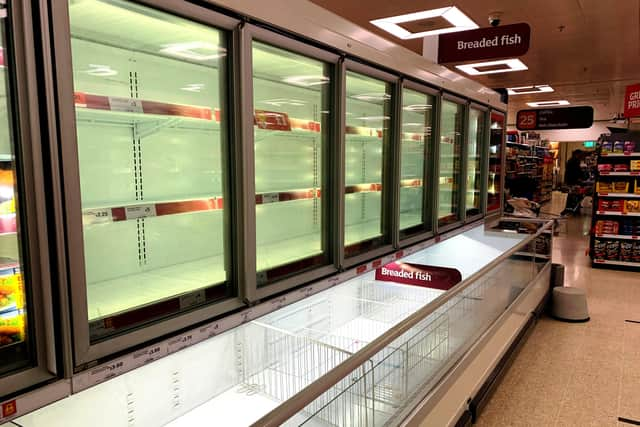NI supermarket business figure: No food shortages, only choice issues
and live on Freeview channel 276
Aodhan Connolly from the Northern Ireland Retail Consortium (the Ulster wing of the giant British Retail Consortium) was speaking as pictures continued to surface last week of empty shelves.
The blame for the shortages has widely been laid at the door of the Northern Ireland Protocol; an element of the UK’s post-Brexit deal which means that GB-to-NI shipping firms must now contend with extra paperwork and port checks.
Advertisement
Hide AdAdvertisement
Hide AdFor example, one individual shared their grocery list with the News Letter from a shopping trip to Tesco in Lisburn at the weekend.


The following items were all unavailable: fresh blueberries, fresh strawberries, Honeydew melon, and frozen blackberries. The store did not try to replace the last three with anything similar.
Mr Connolly said he had gone to two different Belfast stores on Sunday morning, and both “had plenty of stock – it is really dependent which supermarket you go to”.
“At this time of year [the UK] is very reliant on stuff coming from the EU – it’s about 90% of lettuce , 80% of tomatoes and about 65% of fresh fruit and veg,” he said.
Advertisement
Hide AdAdvertisement
Hide AdHe said more red tape is now required to import these from the continent to England. And then they make their way from GB to NI (more checks and paperwork).
“And those things are perishable, and have very little shelf-life.
“We already had about 18 hours less shelf-life than Birmingham and Bolton simply because of our geography.
“When a lorry gets here it has to go into a picking bay.
“Stuff gets picked out of it, then it goes out to the shop. So if there is a delay and they missing that ‘picking slot’ then that store does not get it for the day – that’s just how it works.”
Advertisement
Hide AdAdvertisement
Hide AdBut he went on to add that the average supermarket has up to 50,000 product lines, “and this is affecting only a couple of hundred”.
He said there is “no single reason” why a small greengorcer may be well-stocked compared to a supermarket, but it could be down to the fact people tend to buy in bulk from supermarkets.
He concluded: “There’s not food shortages, there are choice issues.
“Things are starting to work a lot more smoothly than they had done in the last two weeks.
Advertisement
Hide AdAdvertisement
Hide Ad“Everyone is finding it hard to get used to a new regime we only had a few weeks to get ready for.
“It’s affecting the whole of the UK. The reason it’s pushing us slightly harder is because we’re at the end of the supply chain.
“This week was better than last week, which was better than the week before. Some of the pictures of certain empty shelves, a couple of hours later and they have been replenished.”
More from this reporter:
Advertisement
Hide AdAdvertisement
Hide AdA message from the Editor:
Thank you for reading this story on our website. While I have your attention, I also have an important request to make of you.
With the coronavirus lockdown having a major impact on many of our advertisers — and consequently the revenue we receive — we are more reliant than ever on you taking out a digital subscription.
Subscribe to newsletter.co.uk and enjoy unlimited access to the best Northern Ireland and UK news and information online and on our app. With a digital subscription, you can read more than 5 articles, see fewer ads, enjoy faster load times, and get access to exclusive newsletters and content.
Advertisement
Hide AdAdvertisement
Hide AdVisit https://www.newsletter.co.uk/subscriptions now to sign up.
Our journalism costs money and we rely on advertising, print and digital revenues to help to support them. By supporting us, we are able to support you in providing trusted, fact-checked content for this website.
Alistair Bushe
Editor